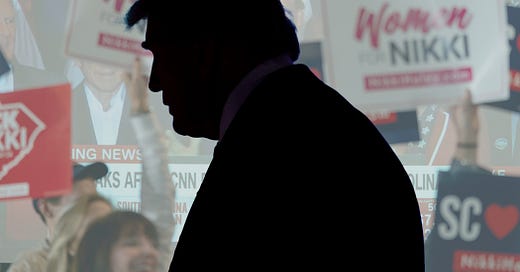EXCLUSIVE: Poll Finds Large Chunk of Haley Voters Ready to Ditch Trump
Republican and independent backers of the former U.N. ambassador are far more open to voting Democratic than four years ago.
A SIGNIFICANT CHUNK OF SELF-IDENTIFIED Nikki Haley voters say they will support Kamala Harris for president, according to a new survey shared exclusively with The Bulwark.
If the election were held today, Donald Trump would win just 45 percent of those who backed Haley in the GOP primary while 36 percent said they’d back Harris, the new poll shows, according to the survey of 781 registered Republicans and independents conducted by the new Democratic-leaning polling outfit Blueprint. The poll did not include Democrats or Democrat-leaning Independents who supported Haley.
Trump’s level of support from Haley voters in the poll represents a significant drop in support for Trump, who won those same voters against Joe Biden by 59-28 percent. That 22 percentage point change in preference (from plus 31 percent for Trump in 2020 to plus 9 percent in this survey) could represent a swing of millions of votes.
The findings are among the most substantive analyses of Haley supporters. They come on the heels of a New York Times/Siena College poll showing that Harris has made major inroads among GOP voters, with 9 percent saying they planned to support the vice president, up from 5 percent from a survey last month.
“Between 5 and 10 percent of Republicans and Republican-leaning independents are Nikki Haley supporters,” said Evan Roth Smith, the lead pollster for Blueprint, which conducted the poll between September 28 and October 6. “If Harris can indeed win a third or more of them in the general election, it will provide a boost of a couple percentage points. In such a close race where the margin of victory will be razor-thin, particularly in the swing states, it’s clearly worth pursuing these voters.”
Harris’s campaign has made aggressive efforts to reach disaffected Republicans in the final weeks of the election, leaning on longtime conservatives and former Trump officials as surrogates and featuring them in ads.
Haley supporters are those that the campaign believes it needs to reach. During the GOP primary, a chunk of the electorate consistently supported the former U.N. ambassador over Trump, even after she suspended her campaign. What was less clear was whether they were Democratic-leaning voters who would naturally vote for the Democratic ticket anyway, Republicans who would come home to Trump, or Republicans who would cross the aisle if the former president emerged as the party’s nominee.
The Blueprint survey fills in some of those answers. It shows slippage for Trump among both Haley voters who identified as Republicans and those who identified as independents. Only 49 percent of Republican Haley voters plan to vote for Trump in 2024, compared to 64 percent who voted for him in 2020. Among independent Haley voters, only 38 percent said they were voting for Trump, compared with 48 percent who backed him in 2020.
Overall, Haley voters who participated in the Blueprint survey had negative views of both candidates though slightly worse for Trump. The former president was viewed favorably by 27 percent of this pool compared to 73 percent who viewed him unfavorably (for a -46 percent rating). Harris, by contrast, had a -32 percent approval rating (34 percent favorable and 66 percent unfavorable). Notably, President Joe Biden, who bowed out of the race in July, was viewed even more negatively than Trump, with a 25 percent favorable rating among Haley voters and a 74 percent unfavorable rating for a net -49 rating.
The self-identified Haley voters in the Blueprint survey appeared to find themselves in a political island. A virtually equal percentage said that they believed the Democratic party (27 percent) and Republican party (26 percent) had gotten more extreme. (Fifty-six percent said both parties have become equally more extreme.) Similar percentages said that the Democratic party (30 percent) and Republican party (31 percent) had become more accepting of moderate and swing voters.
As for what’s impacting those perceptions, Haley voters say they are more concerned that Trump’s character is erratic (84 percent) rather than that his policies were too extreme (64 percent). For Harris, the problem is reversed: 70 percent said her policies were too extreme while 57 percent said her character was too erratic.
Haley herself has endorsed Trump despite a primary campaign that, she acknowledged, grew divisive and personal by the end. She spoke at the Republican convention this July and in September, she signed a fundraising email for the ex-president, noting that she worked for him and declaring that they were “on the same team.” But she has not yet appeared with Trump on the trail and the two do not appear to have spoken.
A Trump adviser familiar with the former ambassador’s role in the campaign told The Bulwark that Haley is planning to fundraise for the campaign and has recorded a robocall targeting independents and voters such as the ones surveyed in the Blueprint poll, the adviser said. Haley also may join Trump on the campaign trail or have her own surrogate events.
“Haley is very much on the team and is true to her word,” said the adviser.
A Haley spokeswoman and adviser did not return messages for comment.
But Haley’s larger absence has sparked concern in some conservative quarters. Conservative Washington Post columnist Marc Thiessen wrote on Tuesday that Haley could serve as a key validator for Trump among those Republicans who remained on edge about sending him back to the White House. “Why is Trump not deploying her on the campaign trail?” Thiessen asked.
Haley has said she is willing to take on the task. She recently told CBS’s Face the Nation that the former president “knows I’m on standby . . . but there hasn’t been an ask as of yet.”






